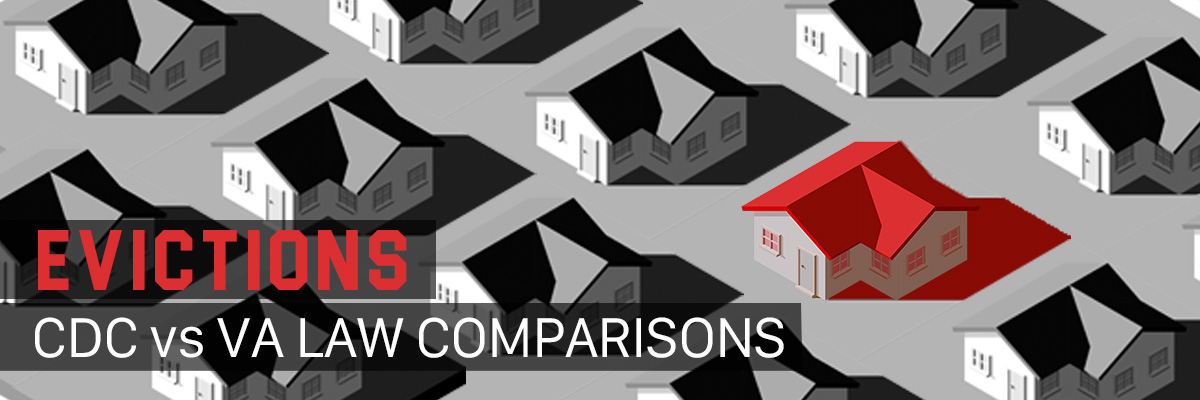Evictions: Comparing the CDC Order & VA Law Requirements
February 17, 2021

We receive a lot of questions on the Legal Hotline about where eviction moratoriums stand and what property managers can to do when they have tenants who are not complying with the lease.
As of February, there are two sets of protections for tenants that overlap: The Centers for Disease Control and Prevention (CDC) Order issued on September 2020 and then extended in December 2020 and January 2021. The CDC Order is currently effective until March 31, 2021, but continue to watch the Virginia REALTORS® COVID-19 Resources page for any updates. Virginia law, which was passed in November 2020, is effective until the end of the State of Emergency.
The CDC Order is explicit that it does not apply in any state with “a moratorium on residential evictions that provides the same or greater level of public-health protection.” Because Virginia has its own law, it is likely that judges will apply the protections provided for in Virginia law, but it is possible that some judges will follow the CDC order.
Below is a chart to help understand and compare the requirements of the two different protection programs.
Note: Virginia has slightly different requirements for landlords who own (or have a 10% or greater ownership, directly or indirectly in) 5 for more properties subject to a lease in Virginia. These are indicated in the chart as “1-4” for landlords who have four or fewer properties subject to a lease in Virginia and “5+” for landlords who have five or more properties subject to a lease in Virginia.
| Virginia | CDC | |
| Tenant relieved of obligation to pay rent? | No | No |
| Allowed to charge late fees? | Yes | Yes |
| Covered tenants | All tenants | Tenants who provide a declaration under penalty of perjury that includes certain criteria |
| Certification or documentation required by tenant? |
1-4: No
5+: Yes, if the tenant wishes to enter into a payment plan |
Yes |
| Tenant must apply for government assistance? | Yes | Yes |
| Landlord must apply for government assistance? | Yes, if tenant has not notified the landlord he has already applied | No |
| Income limitations for tenants? | No | Yes, tenant expects to make less than $99,000 (individual) or $198,000 (filing jointly) in annual income for 2020; was not required to report any income tax in 2019; or received a stimulus payment under the CARES Act |
| Partial rent payment required? | No | Yes, tenant must make best efforts to make timely payments that are as close to the full payment as possible |
| Income impacted by COVID? | Yes | Yes, the tenant cannot pay the full rent because of a substantial loss of household income, loss of compensable hours or work wages, a lay-off, or extraordinary out of pocket medical expenses that |
| Eviction would lead to homelessness? | No | Yes |
| Notice timeline | 14 days prior to filing for unlawful detainer | None |
| Notice of assistance programs? | Yes, notice must include information on the Virginia Rent and Mortgage Relief Program & how to reach 2-1-1 to determine any additional federal, state, and local rent relief programs | No |
| Payment plan required? |
1-4: No
5+: Yes, the notice of late rent must include a statement that if the tenant provides the landlord with a signed statement certifying that the tenant has experienced additional expenses or a loss of income due to COVID, the tenant may, but does not have to, enter into a payment plan. |
No |
| Exceptions | Tenant refuses to cooperate with landlord’s application for relief; written approval from relief programs not received within 45 days; tenant does not qualify for funds; no funds are available | No |
You might also like…
Examining Rental Challenges in Virginia
By Dominique Fair - September 24, 2024
The rental market has seen a significant cooldown in rent prices over the last two years, but many renter households, specifically those with lower incomes, struggle to afford… Read More
Three Multifamily Market Trends from the Second Quarter of 2024
By Sejal Naik - July 16, 2024
Each quarter, through its Multifamily Market report, the research team at Virginia REALTORS® analyzes the trends and changes in the multifamily market. Here, we share the key highlights… Read More
Annual Building Permit Trends for Multifamily Housing Units
By Sejal Naik - June 24, 2024
The latest annual building permits data indicates fewer multifamily units are in the pipeline in Virginia’s housing market. In 2022, multifamily residential building permits in Virginia were at… Read More